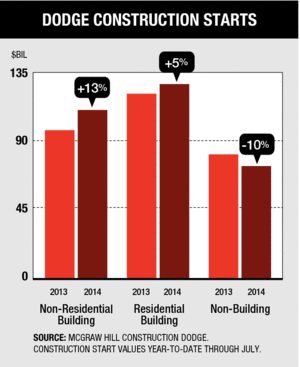
Dodge Construction Starts in July Up 4% Over a Year Ago
Construction starts through the first seven months of this year are up 4% over the same period in 2013, according to McGraw Hill Construction Dodge. Through July, Dodge reports $312 billion in new construction starts, with the biggest boost coming from a 13% hike in non-residential building starts. "The construction expansion is getting more of a contribution from non-residential building," says Robert Murray, Dodge's chief economist. "Manufacturing-plant construction is seeing the start of numerous chemical- and energy-related projects, consistent with the nation's growing energy sector," he adds. Further, commercial building is maintaining its upward momentum, while the institutional- building sector appears to be stabilizing after a lengthy decline, Murray says. The strong non-residential market has offset the weaker-than-expected residential market, which is up just 5%.
Vermont Pushes New 41-mile Natural-Gas Pipeline Project
The Vermont Public Service Board on Sept. 4 authorized construction of a 41-mile natural-gas pipeline through Addison County that will connect service areas in Chittenden and Franklin counties. Concerns over potential chemical contamination of the soil led the board to halt construction on July 25, until Vermont Gas filed a soil management plan. Vermont Gas had approached the board with concerns that soil contaminated with pentachlorophenol (PCP), used as a wood preservative on utility poles near the pipeline site, could possibly be disturbed by construction. The utility has increased its original estimate for the pipeline project's cost by 40%, to $121.6 million.
'Bridge-in-a-Backpack' Boosted
The Vermont Agency of Transportation is finishing construction of its first bridge-in-a-backpack composite-tube arch bridge to replace the 99-year-old Fairfield Bridge in Franklin County, Vt. Wayne Symonds, structural engineer for the state agency, admits the cost of replacing the deteriorating single-span structure was close to the conventional concrete-arch option, and there is no significant time savings in the design phase due to the learning curve that will be required to implement the carbon-fiber-tube technology. "But, in the future, we see this as an accelerated bridge construction technique for quick construction in the field with short-term road closures," he says. The inflatable carbon-fiber tubes used to construct composite bridge arches were developed by Advanced Infrastructure Technologies in collaboration with the University of Maine, both in Orono.

